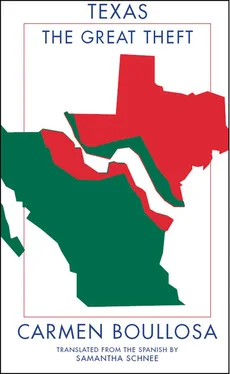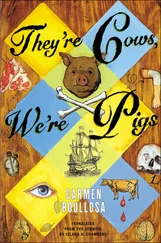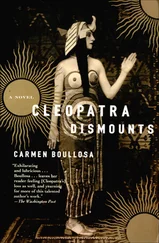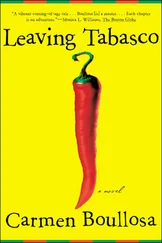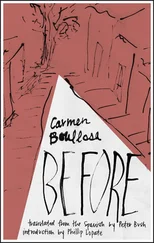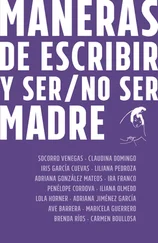Carmen Boullosa
Texas: The Great Theft

Texas-Mexico Border (1859)
(go ahead and skip it if you want)
LET’S STATE IT UP FRONT, so we don’t get muddled: this is the year 1859.
We’re on the northern and southern banks of the Río Bravo, known to some as the Rio Grande, in the cities of Bruneville and Matasánchez. Heading into the wind on horseback we could make it to the sea in half a morning.
Bruneville and Matasánchez call themselves cities, but you be the judge of whether they should be called towns.
I should tell you a few things about them: Bruneville is part of the state of Texas, Matasánchez is part of Mexico. The former (Bruneville) hasn’t been around long, only since ’21, when Mexico declared its independence.
That year, Mexico’s Far North was sparsely populated, though there were a few ranches scattered around — like the ones owned by Doña Estefanía which extend from the Nueces River all the way south to the Río Bravo — you’d have to ride four days to cross her lands from south to north.
Back then buffalo flourished. Mustangs ran free. Since the grasslands hadn’t been sown, you didn’t find cattle in herds; they grazed in twos or threes. But the Indians abounded, and they traveled in bands.
Indian Territory lay to the northeast, where the Apaches had lived since God created the Earth, and where a variety of northern tribes had moved, evicted from their homelands by the Americans, or fleeing from them. Since the Indians were so different (some were hunters and tanners, some farmers, some warriors), they didn’t share their territory in holy peace, no matter how similar we’d like to think they were.
To protect their northern frontier from greedy Europeans and warlike Indians, the Mexican federal government invited Americans to live there. The government loaned them land or just gave it to them, sometimes even throwing in some livestock on certain conditions. To be perfectly clear: they made them sign contracts swearing to abide by the Catholic faith and pledge their allegiance to the Mexican government. However, they refused from the beginning to allow the importation of slaves, relenting only under great pressure, allowing a few in dribs and drabs.
In ’35 the gringos responded to Mexico’s generosity by declaring their independence. They were motivated by their own interests, especially the right to own slaves. The brand new (slaveholding) Republic of Texas declared its southern frontier to be the Nueces River.
At that time the sowing of the grasslands had begun — the grass seeds greedily hogging everything the earth had to offer — while acacias were burned down to make way for herds of livestock, which grazed and multiplied. The buffalo were decimated by hunters. The arrows of the hunter tribes frequently flew in vain, without finding targets.
It goes without saying that this was like a slap in the face to the Mexican government and made its landowners and ranchers hopping mad.
Then, in ’46, the Republic of Texas joined the United States, becoming the Lone Star State.
Immediately Texas claimed that its territories extended to the Río Bravo.
And you already know what happened after that. The Americans invaded us.
In ’48, after the invasion (which they called the Mexican-American War, some nerve!), they declared that the Río Bravo was the official border. To stake their claim, the Texans founded Bruneville where previously there had been nothing but a dock built by the town of Matasánchez, “just in case.” Matasánchez became a border town.
Immigrants flooded into Bruneville from all over, some respectable folks, and some American lawyers determined to enforce the new laws, which meant shifting ownership of the land to the gringos. There were all kinds of crooks, the aforementioned, well-dressed ones who robbed (Mexicans) from behind their desks, as well as the kind who tied kerchiefs over their faces. And there were those who did a little of both.
It’s under these circumstances that our story takes place, at the time of the Great Theft.
(which begins in Bruneville, Texas, on the northern bank of the Río Bravo, one day in July of ’59)
IT’S HIGH NOON IN BRUNEVILLE. Not a cloud in the sky. The sun beats down, piercing the veil of shimmering dust. Eyes droop from the heat. In the Market Square, in front of Café Ronsard, Sheriff Shears spits five words at Don Nepomuceno:
“Shut up, you dirty greaser.”
He says the words in English.
At that moment, Frank is crossing the plaza, muttering to himself, “…and make it snappy, make it snappy,” in English, which he speaks so well that people have changed his name from Pancho Lopez to Frank. He’s just delivered two pounds of meat and one of bones (for stewing) to the home of Stealman, the lawyer. Frank is one of the many Mexicans in the streets of Bruneville who run errands and spread gossip, a “run-speak-go-tell,” a pelado. He hears the insult, raises his eyes, sees the scene, leaps the last few feet to the market, and runs to Sharp, the butcher, to whom he blurts out the burning phrase at point-blank range: “The new sheriff said, ‘Shut up you dirty greaser!’ to Señor Nepomuceno!”, the syllables almost melting together, and continues immediately, in the same exhalation, to relay the message he’s been rehearsing since he left the Stealmans’ home, “Señora Luz says that Mrs. Lazy says to send some oxtail for the soup,” adding with his last bit of breath, “and make it snappy.”
Sharp, standing behind his butcher’s block, is so startled that he doesn’t respond by saying: “How could a puffed up carpenter dare speak that way to Don Nepomuceno, Doña Estefanía’s son, the grandson and great-grandson of the owners of more than a thousand acres, including those on which Bruneville sits?!” Nor does he take the opposing stance, “Nepomuceno, that no-good, goddamned, cattle-thieving, red-headed bandit, he can rot in hell for all I care!” These two perspectives will soon be widely debated. Rather, in his eagerness to spread the news, he (somewhat melodramatically) claps his left hand to his forehead and glides (dragging his long butcher knife, which scratches a jagged line on the earthen floor) two steps to the next stall, which he rents to the chicken dealer, and shouts, “Hey, Alitas!”, repeating in Spanish what Frank has just told him.
It’s been three weeks since Sharp has spoken to Alitas, supposedly they had a disagreement about the rent for the market stall, but everyone knows that what’s really pissed off Sharp is that Alitas has been trying to win his sister’s heart.
Alitas — happy to be on speaking terms again — enthusiastically joins in broadcasting the news, shouting, “Shears told Nepomuceno, ‘Shut up, you dirty greaser!’” The greengrocer, on hearing the news, repeats it to Frenchie at his seed stall, Frenchie passes it on to Cherem, the Maronite at the fabric stand, where Miss Lace, Judge Gold’s housekeeper, is examining a sample of material that’s recently arrived — a kind she hasn’t seen before but is perfect for the parlor curtains.
Sid Cherem translates the phrase back into English and explains to Miss Lace what has happened; she asks Cherem to save the cloth for her and hurries off to share the news with her employer, leaving behind Luis, the skinny kid who’s carrying her overloaded baskets. Luis, distracted from his duties by the rubber bands at a neighboring stand (one would be great for his slingshot), doesn’t even realize Miss Lace has gone.
Читать дальше
